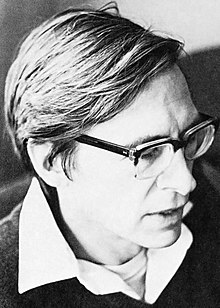John Rawls
John Borden (Bordley) Rawls (Baltimore (Maryland), 21 febrewaris 1921 – Lexington (Massachusetts), 24 novimber 2002) wie in Amerikaansk filosoof dy't benammen bekend waard troch syn etyske en politike filosofy. Hy wie as polityk filosoof ferbûn oan de Harvard University en wurdt om syn haadwurk A Theory of Justice en besibbe publikaasjes algemien beskôge as de meast ynfloedrike politike filosoof fan de 20e iuw.

It begryp ‘sosjale rjochtfeardichheid’ spile in grutte rol yn syn tinken. Hy bepleitet in sterke beskerming fan grûnrjochten en –frijheden foar elkenien. Sosjale of ekonomyske ûngelykheid is inkel dan akseptabel, as elkenien likense kânsen hat om in hegere posysje te berikken en as de minstbedielden absolút foardiel hawwe fan de relative ûngelykheid.
Publikaasjes bewurkje seksje
Boeken bewurkje seksje
- A Theory of Justice. Cambridge, Massachusetts: Harvard University Press, 1971. 1999 ferskynde in nije ferzje.
- Political Liberalism. Columbia University Press, 1993. De paperback is wiidweidiger as de ynbûne edysje.
- The Law of Peoples. Met daarin 'The Idea of Public Reason Revisited' Cambridge, Harvard University Press, 1999.
- Collected Papers. Harvard University Press, 1999.
- Lectures on the History of Moral Philosophy. Harvard University Press, 2000.
- Justice as Fairness: A Restatement. Cambridge, Belknap Press, 2001. In koarte werjefte fan de teoryen fan Rawls.
Artikels bewurkje seksje
- A Study in the Grounds of Ethical Knowledge., dissertaasje, Princeton University, 1950.
- Outline of a Decision Procedure for Ethics. Philosophical Review (april 1951), 60 (2): 177-197.
- Two Concepts of Rules. Philosophical Review (jannewaris 1955), 64 (1):3-32.
- Justice as Fairness. Journal of Philosophy (oktober 24, 1957), 54 (22): 653-662.
- Justice as Fairness. Philosophical Review (april 1958), 67 (2): 164-194.
- The Sense of Justice. Philosophical Review (July 1963), 72 (3): 281-305.
- Distributive Justice: Some Addenda. Natural Law Forum (1968), 13: 51-71.
- Reply to Lyons and Teitelman. Journal of Philosophy (5 oktober, 1972), 69 (18): 556-557.
- Reply to Alexander and Musgrave. Quarterly Journal of Economics (novimber 1974), 88 (4): 633-655.
- Some Reasons for the Maximin Criterion. American Economic Review (maaie 1974), 64 (2): 141-146.
- Fairness to Goodness. Philosophical Review (oktober 1975), 84 (4): 536-554.
- The Independence of Moral Theory. Proceedings and Addresses of the American Philosophical Association (novimber 1975), 48: 5-22.
- A Kantian Conception of Equality. Cambridge Review (febrewaris 1975), 96 (2225): 94-99.
- The Basic Structure as Subject. American Philosophical Quarterly (april 1977), 14 (2): 159-165.
- Kantian Constructivism in Moral Theory. Journal of Philosophy (septimber 1980), 77 (9): 515-572.
- Justice as Fairness: Political not Metaphysical. Philosophy & Public Affairs (simmer 1985), 14 (3): 223-251.
- The Idea of an Overlapping Consensus. Oxford Journal for Legal Studies (maitiid 1987), 7 (1): 1-25.
- The Priority of Right and Ideas of the Good. Philosophy & Public Affairs (Fall 1988), 17 (4): 251-276.
- The Domain of the Political and Overlapping Consensus. New York University Law Review (maaie 1989), 64 (2): 233-255.
- Roderick Firth: His Life and Work. Philosophy and Phenomenological Research (maart 1991), 51 (1): 109-118.
- The Law of Peoples. Critical Inquiry (hjerst 1993), 20 (1): 36-68.
- Reconciliation through the Public Use of Reason. Journal of Philosophy (maart 1995), 92 (3):132-180.
Oer Rawls bewurkje seksje
- Norman Daniels ed., Reading Rawls: Critical Studies of A Theory of Justice. New York: Basic Books, 1974.
- Chandran Kukathas & Philip Pettit,Rawls: A Theory of Justice and its Critics. Stanford: Stanford University Press, 1990.
- Samuel Freeman ed., Cambridge Companion to Rawls. Cambridge: Cambridge University Press, 2003.